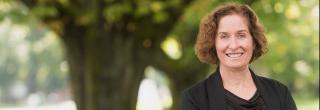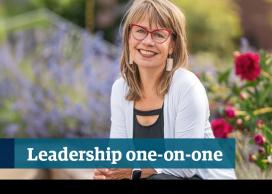Dr. Meigan Aronson joined UBC as Dean of Science in 2018. She is a physicist by trade, but in her role as Dean, brings a strong commitment to academic leadership, research excellence, and teaching and learning. She is passionate about science and has a deep commitment to the advancement of both her field and the students and faculty within it.
Prior to joining the university, Dr. Aronson held the title of Professor of Physics and Dean of the College of Science at Texas A&M University, where she had appointments in both the Department of Physics and Astronomy and the Department of Materials Science and Engineering.
In addition to her extensive publication record, and her list of honours and fellowships, Dr. Aronson has a zest for life, adventure, and travel.
Q1. What quality do you most admire in a leader?
MA: An appreciation for the human condition. Everybody has their own struggles, but people are still capable of achieving amazing things if you have a willingness to accept them as they are. We depend on the uniqueness, creativity, and diversity of the people we work with.
I also believe in honesty and clarity. What do I mean by clarity? Tell it like it is. Listen to what others are saying, and make sure your motivations are well understood. People are more likely to follow you and subscribe to your vision if you can excite them with a clear and thoughtful idea.
Q2. What makes you laugh?
MA: I’d love to be able to say that I have a dry sense of humour, but in reality, what makes me laugh is watching people and animals do crazy silly things. My kind of humour requires no interpretation. Cats doing pull-ups, for instance.
Q3. Who inspires you, and why?
MA: People who inspire me are the ones who forge their own path, go their own way, and try to figure things out on their own. I admire this quality, particularly when people do it for no other reason than for themselves. When I was growing up, the senior ladies in my family were definitely of this ilk — they went off and did things that, in retrospect, seemed remarkable to me — but nobody knows about this, other than my family.
One of the women who was a strong and early influence on me was my paternal grandmother. She came from a small farming town in Pennsylvania and because she was eager to find herself and see the world, she went to college to study biology and eventually moved on to teach at the American College of Greece, in Athens. Every week, she wrote letters home to her family in which she shared her experiences and recounted her weekend travels to different places around the Middle East. I loved her story about how she climbed one of the pyramids: ‘like climbing on the kitchen table 1,000 times’. I always admired the way she lived. She had a real sense of adventure and loved life.
Q4. For you, what makes UBC different?
MA: The trajectory of UBC as a university, coupled with the calibre of faculty members and executives here. There is a strong proactive and forward-thinking attitude of what we can do together, and a tangible sense of possibility. We’re being encouraged to try new things and different ways to improve ourselves and our Faculties. I believe in this organization and its hopes for itself — it infuses my scholarship and that of my colleagues.
Q5. What is the most important lesson you’ve learned, in your career to date?
MA: Don’t be afraid. If there’s something that you want to achieve or think needs to be done, just get on with it — you can do it and it’s likely to work out. If you feel committed to something or want to do anything of importance, you need to stay the course. You cannot obsess about whether it’s going to be successful — some of the time you are just going to fail if you are ambitious enough. But often you won’t. Make some hard decisions and do what you really value.
Q6. How do you like to recharge?
MA: I lift weights at the gym and I’m a big reader. I’m really drawn to accounts of world travel and solo exploration.
Two books that have been long-time favourites of mine detail the stories and exploits of Owen Lattimore and his wife Eleanor Holgate Lattimore — American authors, educators, and influential scholars of China and Central Asia. In the 1920s, Owen travelled the Silk Road through northern China, into modern Xinjiang, and on to the Tian Shan Mountains. Meanwhile, his wife started her trip in Cambridge and took herself across Siberia by rail — they somehow managed to reunite in modern-day Kazakhstan. They wrote their own books to commemorate their separate journeys and share their impressions travelling close to the land. Needless to say, he and his wife seemed like remarkable people that I would have loved to know.
Q7. What is the best advice you were ever given?
MA: In my professional life, I’ve had to learn that sometimes things take time and ‘slow can be fast’. If I need to develop a process or make something happen, I need to think carefully about how to do it. The discipline of doing research and learning physics was the first step in learning to be patient, but becoming an administrator — working with others and trying to promote an agenda — carried significantly more responsibility and was a good reminder of the importance of being thoughtful with my actions.
I’m definitely the ‘leap before I look’ type. My natural tendency towards spontaneity and sense of adventure is a big part of me.
Q8. What do you value in your colleagues?
MA: I like seeing colleagues who are really committed to science and who have a genuine joy in what they’re doing. I too, have an emotional connection and an uncomplicated enthusiasm for our work and our field. I really enjoy being around colleagues who talk about how cool science is, because that’s how I feel as well.
Q9. What do you hope will be your lasting impact at UBC?
MA: Now that I’ve been here a year, I’m starting to see what it is that I can contribute and where I can have a meaningful impact. Above all, I want my colleagues and my students to feel better connected — or reconnected — to the joy of science, and to be able to pursue their scientific dreams here, which because of the people we have here could never have developed anywhere else.
My predecessor did a heroic job of building an infrastructure for improving scientific pedagogy and the way that we approach teaching, so it would be great to see more of our students gain hands-on opportunities to work in labs, both here and outside of the university. My colleagues and I know from our own experiences that being accepted into a research group and doing something real are transformative experiences, giving students a chance to feel like they are at the centre of it all. It gives them a real sense of achievement and experience. I want students to find something they love and to feel empowered to pursue it in their future life.
Q10. If you could have a super power, what would it be?
MA: Teleportation! I want to be able to go anywhere at any time. You could live anywhere in the world, and you’d never have to face any traffic on your commute into work, or waste extra days when traveling for business meetings.
Mind you, I enjoy the travel process when it’s for leisure or adventure travel. My goal is to visit all places left in the world where there’s no internet… and that gets harder and harder every year. I love visiting remote and far-off corners of the world, and living in the moment in a place totally unlike my own.
Q11. What role does science play in helping address society’s big challenges? How has this changed over the years?
MA: I think science is foundational. If you consider the big challenges — availability of food, water, and energy, remediating climate change and ecological decline, access to health care, more uniform allocations of money and resources, etc. It’s clear there is no one scientific discovery that would change or solve any of issues of this scale.
The availability of a remedy or helpful scientific discovery is not, in and of itself, a solution. You still need to work in a very serious and deep way with the social sciences as well as the humanities to effect real change. I think the university does an unusually good job in terms of understanding the interconnectedness of all these players when addressing large complex global issues.
This kind of thinking has only really happened in the last 10-15 years. When I was growing up, we were all really influenced by The Manhattan Project and the Space Race — it was the glory days for technology and scientific discovery, and it’s exciting to have seen this fundamental change in the scope of our vision over the course of my career.
Q12. What is your vision for the Faculty of Science over the next three years? What do you hope to achieve?
MA: I spent most of last year talking to all of the different units and lots of different people across the Faculty, so I’m starting to understand what makes my colleagues tick. I feel that the university is at a really positive place right now. Many of the issues facing the Faculty of Science over the past five to ten years have equilibrated, and we now have the bandwidth to think about this big question of how we would like to improve things for ourselves.
The Faculty has been clear about wanting to advance our research mission, try new things, and explore more interdisciplinary work, connecting us to those ‘big-challenge’ issues. Therefore, I’m aiming to invest more in the research side of our enterprise and help our Faculty build the connections they need to help them pursue these new directions.
We also take a lot of pride in the progress we’ve made in teaching within the Faculty. In particular, the increase in interest, literacy, and utility in data science and computation. There is a lot of appetite for infusing understanding and new ways of thinking throughout our curriculum, and even into research. It will be exciting to see how we end up doing this.
Published: January 1, 2020
Interviewed by: Rivka Parris, UBC Internal Communications



